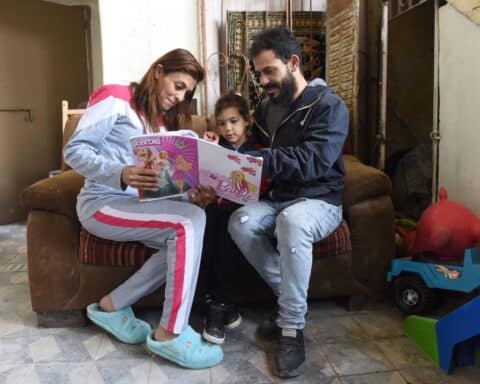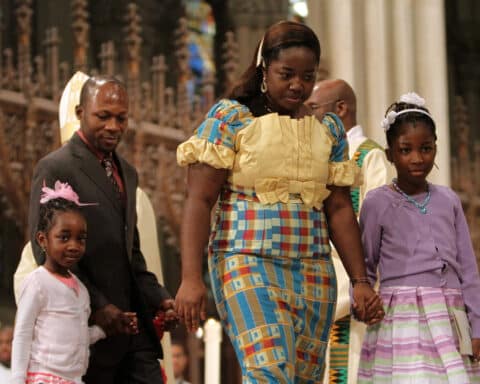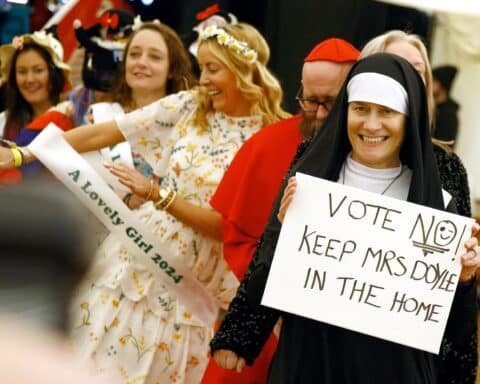Big families look really loony to me. I have caught myself thinking, “Holy cow, how does she DO it?” when I see a young mom surrounded by little kids on all sides, all of them bopping up and down and squawking and demanding attention. Sometimes I stop and discreetly do a head count of all the little heads that belong together, and I have a little revelation. Five, six, seven ….
… Oh. I had even more kids than that.
But it does look like a lot, from the outside. It is a lot. ANY amount of kids is a lot! One kid is a lot! But I had 10, after all. No wonder people were always staring at us. I get it now. Some of my kids have moved out, and none of them are really little, and while I’m not an empty nester yet, I’m out of the woods enough that I can see it from the other side. I see how we looked to other people when we were really in the thick of it: beautiful, but undeniably loony.
A unit of individuals
Part of the reason for this is that, from the outside, a big family looks just like that: a big family. A unit. If you know a few big families only by sight, and not personally, you probably think of them as “the one with all the loud, redheaded kids” or “the one where they all look like farmers.” More than one person has told us we’re “that family with all the hair,” which I fully recognize is not the worst way we could be identified.
The point is, when there are a lot of kids in a family, it’s kind of a blur from the outside. Outsiders see that everyone in the family kind of resembles each other, and they’re sort of milling around the parents, and maybe you can recognize the oldest and the current baby, but in the middle — who knows? They’re just part of the bunch.
But believe me when I say that this is not how the parents see it, not unless something has gone very wrong in the family. Sometimes the wrong name comes out of my mouth when I’m calling a child, but this is just the general confusion of my brain, and it doesn’t mean I don’t know who they are. They are all unambiguously themselves and have been since day one.
I, like every decent mother of a large family that I know, take my children’s individuality extremely seriously, and they don’t seem like an undifferentiated mass to me, and they never have. They don’t even really look alike to me, except in little fleeting flashes here and there. I made them all individually, one at a time, and even when they were born very close together and raised under more or less the same circumstances, they have all always been so very different and distinct from each other. It has always been startling and bizarre to realize that, to people outside the family, we are just some kind of indeterminate welter of humanity, just a sort of Fisher borg.
The domestic church
We do have to treat our large family as a unit in some ways, buying large amounts of food and giant vehicles and sharing clothing and making plans based on the reality that parents cannot bilocate, and simply cannot accommodate every possible thing 10 individual children, no matter how cherished, would like to do. But in other ways, we tried (with varying success) to think of them as, and to convey to them that they are, distinct, and distinctly important; unique, and uniquely valuable.
Well, there is a reason we refer to the family as “the domestic church.” Each family is a small (or in some cases, not so small) image of the one, holy, Catholic, apostolic church as a whole. And that means that, just as with a family, no matter how big the Church gets, it never stops being made up of individuals. Individual Catholics who are distinct, distinctly important, unique, and uniquely valuable in the eyes of God.
Outsiders, and other Catholics, and maybe even pastors and bishops and the pope himself might see the Church as a unit, as a blur, as a Catholic borg. It happens. It’s hard to be in charge of a large group of people and not treat them like a unit.
But God never does this.
Distinctly loved by God
God, with his strange, ineffable combination of omniscience and penetratingly tender attention to the individual, is capable, and apparently endlessly willing and committed, to seeing us as individuals. And he acts accordingly.
God never thinks of us as “part of the Church.” He never thinks of us as “one of those humans” or “one of those sinners” or even “one of humanity I came to save.” He has a very specific concern for me in particular. He has some kind of specific divine delight when I am happy, and some kind of specific divine distress when I am in pain. This is very strange! But it appears to be true. It appears to be how the whole thing (by which I mean salvation history) was designed, and it is why, when he comes to us in the sacraments, it’s always a very personal thing, very hands-on, very individual. We don’t do this as a borg. It’s always one-to-one, even if there’s a crowd of people to get through.
It’s not always a comfort to know that we’re individuals in the eyes of God. Sometimes we wish we could disappear into the blur. We’d like to recede into the crowd and escape attention by pretending we’re no one in particular.
But God, like any good mother, will not allow this. He loves us too much, and knows us too well, to pretend there’s anyone else like us, or anyone who could replace us. We would do well to allow him to see us for who we really are, and to let him help us make our plans accordingly.





